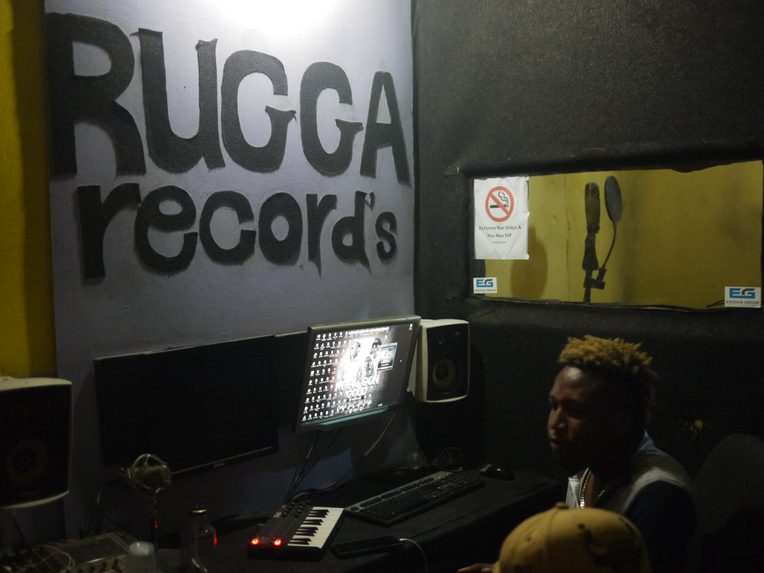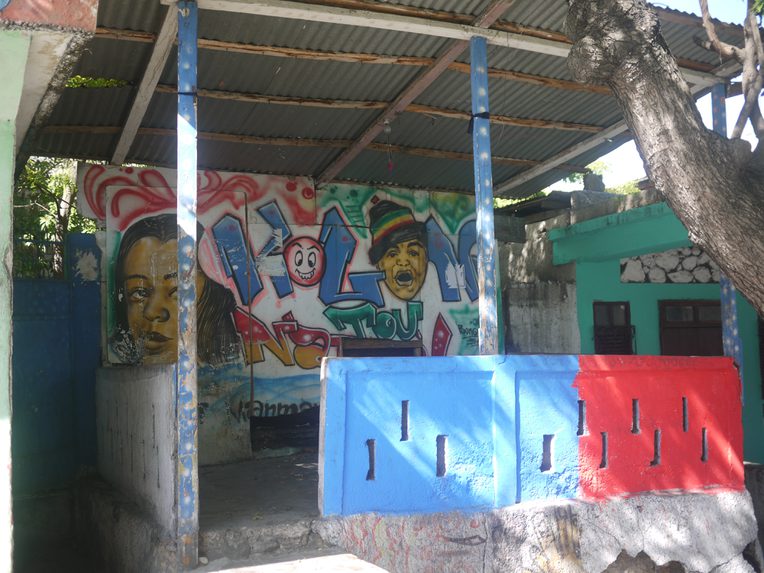Deported Yet Not Departed: How Do the Banished Reclaim Their Joy?
From the Series: Art and Ethnographic Forms in Dark Times
From the Series: Art and Ethnographic Forms in Dark Times

Richard is a thirty-seven-year-old man who was deported to Haiti from the United States in July 2020. As a nine-year-old, Richard fled Haiti with his mother in a perilous boat journey to escape the soaring poverty and violence of the early 1990s. After a stay at Guantánamo, they settled in inner-city Baltimore. During high school, Richard was caught shoplifting and possessing marijuana—convictions that barred him from citizenship and limited his work opportunities. “I was frustrated with my life, and that I couldn’t do more to support my family,” he told me. His family included a baby daughter and her mother, with whom he bickered often because of his meager contribution to household expenses. In the heat of one such argument, he broke a window at his wife’s house and was arrested for burglary. After some time in jail, he was transferred to Immigration and Customs Enforcement (ICE) for removal proceedings.
I met Richard in 2017 while serving as a country of origin expert for his deportation hearing. I testified about the hardship he would suffer if he were deported. After losing his case, he was filled with fear. Without family in Haiti or fluency in Creole, it would be hard to find a place to live and work. He was particularly worried that his dreadlocks would associate him with a “gangsta” identity. He assumed fellow Haitians would view him as a dyaspora pèpè (discarded diaspora) at best and a bandi (violent criminal) at worst. Richard knew that the Haitian government had publicly blamed depòte (deportees) for introducing gangs and kidnapping to Haiti, and he had heard of depòte who had been wrongfully arrested and died in police detention. “They’ll fear me even without knowing anything.”

But Richard was also hopeful. He looked forward to leaving detention and was cautiously optimistic that Haiti could offer a new beginning. “There, they don’t know me. Maybe I can make a fresh start,” he told me. He planned to capitalize on his English-language skills and American—in particular, Black American—cultural capital, as had other deportees I was working with, including two thirty-year-old men who ran a smoke shop and DJ business. Three others, all men under forty, earned modest livings by freelancing, respectively, as a videographer, clothing designer, and hip-hop music producer.
With a background in DJing, Richard dreamed of opening a rap studio. “I want to bring new styles and rhymes to Haiti and to get people to think about the ghetto differently, because we created a new music. That’s not easy.” He also recognized how Haitian people used music to voice social concerns and political grievances. “For us, music has a lot of power. I learned from my mom that music in Haiti is like the news in the U.S. It can tell you the reality and make you really angry and wanting to change things.”
“But does this change require violence?” I asked.
“It can show the reality, and that can make you mad and want to do something for it to be different. So yes, but also no, because the something need not be shooting all the time. It can be singing together to see the things now that are not good.”
Richard vacillated between anticipation of his release and dread of deportation. Before his deportation, he had a recurring nightmare of being detained in a Haitian prison. He would wake drenched in sweat, his heart racing. But when telling me this, he also shared plans for his new business. “Sometimes I feel like there are two things fighting inside my head—a good dream and a bad one,” he reflected. In his struggles to redefine that which most troubled him, I saw an attempt to concretize and manage what was unpredictable and uncontrollable.
Since arriving in Haiti, this dueling sentiment has endured. Richard’s plans have been curtailed by the exigencies of life in a new country: finding housing, getting an ID, learning the language. His first months were far from the optimistic picture he had sometimes entertained while in detention. He rents an apartment outside the city and lives off of sporadic work at a call center fielding queries for American customers and the meager remittances sent from his U.S.-based family. Establishing a rap studio has proven impossible. “I need to move into the city, and I need a down payment for it so I can get a space and some help,” he told me. “I don’t see how anything can happen with COVID. Maybe after this, people can send money for the studio.”

As I noted above, a common expression for deportees in Haiti is dyaspora pèpè. This concept links diaspora with pèpè, secondhand clothes from the United States resold in Haiti. This phrase connects form and content, process and meaning, to illustrate the manifold ways in which the deported are signified and resignified through the process of deportation. On one level, the phrase highlights the profits at stake in exchanging the discarded. Scholars have identified how the designation of disposability facilitates exploitation of both migrants and the deported: the need for a cheap, compliant, and expendable labor force in not only the United States (De Genova and Peutz 2010; Dowling and Inda 2013; Golash-Boza 2015; Gomberg-Muñoz 2016) but also in migrants’ homelands, with deportees finding work as call center operators (Blitzer 2017; Rodkey 2016), tourist guides (Brotherton and Barrios 2011), or translators for development projects (Peutz 2010).
On another level, the phrase articulates the contradictory yet co-dependent values applied to the deported. The racial and national identity of deportees—as Black and American—renders them vulnerable to discrimination at the same time that it valorizes their forays into racialized work and leisure. The ease of entry into the music or fashion industries, for example, reveals the privilege embodied by the racial and national position of the deported. Yet the Americanness of rap music or hip-hop culture suggests the limits of this integration. The deported shape and are shaped by this ambivalence.
I hope my work reveals the potentials and limitations of re-founding life and livelihood as a depòte. The political and sociocultural forces confronting deportees bring forth a harrowing picture of this form of punishment. At the same time, the everyday forms of resistance and resilience practiced by deportees—from refusing to shave dreadlocks to furthering a hip-hop music industry to establishing a deportee rap forum on Facebook—suggest that profound social change can occur through small acts in pursuit of a better life. Detailing how people like Richard work with and against the repressive structure of deportation elucidates the vital drive and boundless capacity of dyaspora pèpè —building from the ruins a meaningful life and livelihood.
Blitzer, Jonathan. 2017. “The Deportees Taking Our Calls: How American Immigration Policy has Fuelled an Unlikely Industy in El Salvador.” The New Yorker, January 23.
Brotherton, David C., and Luis Barrios. 2011. Banished to the Homeland: Domincan Deportees and Their Stories of Exile. New York: Columbia University Press.
De Genova, Nicholas, and Nathalie Peutz, eds. 2010. The Deportation Regime: Sovereignty, Space, and Freedom of Movement. Durham, N.C.: Duke University Press.
Dowling, Julie A., and Jonathan Xavier Inda. 2013. Governing Immigration Through Crime: A Reader. Stanford, Calif.: Stanford University Press.
Golash-Boza, Tanya Maria. 2015. Deported: Immigrant Policing, Disposable Labor, and Global Capitalism. New York: New York University Press.
Gomberg-Muñoz, Ruth. 2016. “Criminalized Workers: Introduction to Special Issue on Migrant Labor and Mass Deportation.” Anthropology of Work Review 37, no. 1: 3–10.
Peutz, Nathalie. 2010. “‘Criminal Alien’ Deportees in Somaliland: An Ethnography of Removal.” In The Deportation Regime: Sovereignty, Space, and Freedom of Movement, edited by Nicholas De Genova and Nathalie Peutz, 371–412. Durham, N.C.: Duke University Press.
Rodkey, Evin. 2016. “Disposable Labor, Repurposed: Outsourcing Deportees in the Call Center Industry.” Anthropology of Work Review 37, no. 1: 34–43.